The Oldest Phrase in the World March 17, 2015
Author: Beach Combing | in : Ancient
Sentences are passed from mouth to mouth down through the ages: some of these that are both reckoned wisdom and that attain a particularly attractive form remain with us. A simple question now: what is the oldest sentence in continual use? First, some ground rules. The sentences in question cannot be overly general. For example, […]
Jacob of Edessa’s America March 9, 2015
Author: Beach Combing | in : Ancient, Medieval
Many readers of Beachcombing will know Beach’s fellow bizarrist, Esoterx, who writes fascinating posts about ancient, medieval and modern history and in Beach’s humble opinion has the best and wittiest headlines on the internet: a recent discussion of Hellenic religion was called, for example, ‘Muppet Theology’. Often Beach knows Esoterx’s sources, as the two share […]
Immortal Meals #21: The Fish That Killed An Emperor March 3, 2015
Author: Beach Combing | in : Ancient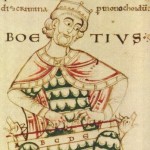
***thanks to Tacitus from Detritus for sending this one in*** Symmachus and the far more famous Boethius were Roman nobles after the end of the Roman empire, an uncomfortable time to be ‘senators’. Boethius fell into disgrace with the emperor Theoderic: he essentially got into trouble for defending, in the law courts, an enemy of Theoderic. […]
A Roman Coin in the Congo! February 10, 2015
Author: Beach Combing | in : Ancient
Roman coins turn up in the wildest places: Sri Lanka, Ethiopia, Iceland… But who would have ever guessed the discovery of a Roman coin in sub-equatorial western Africa? The reference was first given Italian Rivista of Numismatica (vi, 1893, 45). However, the passage quoted here is a digest from Mouvement Géographique (26 Nov 1893): En […]
Goodbye Constantinople February 7, 2015
Author: Beach Combing | in : Ancient, Medieval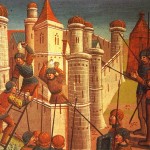
***Some might like to listen to the very topical Strange History theme song while reading this, thanks to Chris S for the tip*** The night of 28 May 1453 the Emperor of Byzantine, Constantine, ‘the eleventh of his name’, went for a ride with his friend, George Sphrantzes, on the city walls of Constantinople, […]
The Rhino’s Horn and Memory February 2, 2015
Author: Beach Combing | in : Ancient
Every so often Beach gets a post from a reader that practically writes itself and the extent of this blogger’s work is the cut and paste button. Here is one such example that goes in the well established oral transmission tag. The correspondent and author was Indranil. Can any reader help out Indranil and his […]
Struell Wells, Ireland: Pagan Customs in the Modern Age? January 15, 2015
Author: Beach Combing | in : Ancient, Medieval
Exciting article by Finbar McCormick from 2009, one that somehow passed Beach by, ‘Struell Wells’, The Journal of the Royal Society of Antiquaries of Ireland (2009), 45-62. FM begins with a careful description of a nineteenth-century Irish water shrine, the Struell Wells (Downpatrick). This shrine is credited through St Patrick with the power of curing. Crowds would […]
The Prisoner in the Temple: the Bloodiest Lie January 13, 2015
Author: Beach Combing | in : Ancient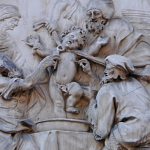
Beach has previously looked at ‘the gong of the world’, the desert boy Apion, who while still brushing sand from his hair, decided to insult the Jews of Alexandria and, indeed, the Jews of the entire Mediterranean. We do not have Apion’s anti-semitic work, the classical equivalent of the Protocols of the Elders of Zion: […]
Burning Library: Apion’s Writings January 7, 2015
Author: Beach Combing | in : Ancient
Beach has sometimes in the past celebrated burning libraries, books (and for the multimedia age films) which we know once existed but that have long since disappeared into the dusty maws of time. An impressive burning library author to add to the growing file is Apion Plistonices, impressive because Apion managed to lose not a […]
A Monkey in the Late Roman Army December 20, 2014
Author: Beach Combing | in : Ancient
Do you remember the ape buried in Iron Age Ireland? Well, here is a cousin, who also travelled far from home. In 2001 a monkey, a macaque, in fact, was dug up at Iulia Libica (Llívia), a late Roman settlement in the Pyrenees. He was, at death, 78 cms tall: a young male. It goes without […]
Roman Coins in Iceland December 16, 2014
Author: Beach Combing | in : Ancient, Medieval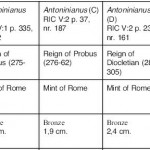
Roman coins have been found within and without the Empire. Denarii and solidii turn up in Scandinavia, Free Germany, Ceylon, Mainland India and Ethiopia, there is even one fascinating outlier in Madagascar (another post, another day). These coins will have arrived in two separate ways. Some will have been brought by Roman traders and some […]
Roman Bowl in Ancient Japan?! December 10, 2014
Author: Beach Combing | in : Ancient, Medieval
Thanks to Ed for this story! This blog has long pioneered wrong place objects, artifacts that turn up thousands of miles from where archaeologists would have expected to find them. So how about a round of applause for this beautiful blue glass bowl that was removed from a tomb in the Nara prefecture in Japan […]
Persians and Romans at the Ends of the Earth December 4, 2014
Author: Beach Combing | in : Ancient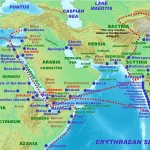
The story is a simple one. A Roman and a Persian arrive by boat at the same time in a foreign port. Both are taken off to see the king (suggesting that the visitors were actually dignitaries) and the king decides to provoke them ‘Which of your kings is the greater and the more powerful?’ Of course, […]
The Oldest Record of an Escaped Slave? November 25, 2014
Author: Beach Combing | in : Ancient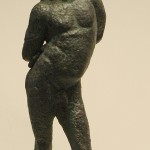
Consider this record reporting an escaped slave named Hermon or alternatively Nilus. About 18 years old, of medium stature, beardless, with good legs, a dimple on the chin, a mole by the left side of the nose, a scar above the left corner of the mouth, tattooed on the right wrist with two barbarian letters. […]
Three Forgotten Democratic Tools from History November 24, 2014
Author: Beach Combing | in : Ancient, Medieval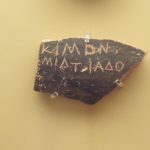
Western democracies run on a fairly limited model with relatively little variety from country to country. There follow three features that have disappeared from our contemporary democracies but that worked (and worked well) in the three most significant strands of historical democracies: ancient Greece, the medieval Italian communes and Viking ‘controlled anarchy’. Ostracisim Ancient Athens […]


